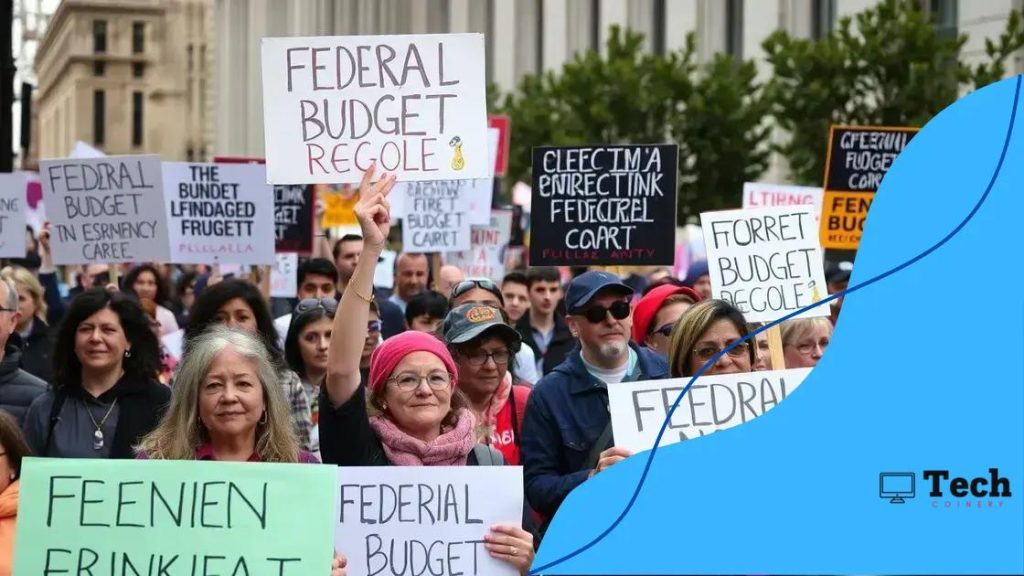Federal budget transparency protests spark nationwide attention

Federal budget transparency protests are movements where citizens demand clear information on government spending, promoting accountability and trust in democratic processes.
Federal budget transparency protests are becoming a significant movement, highlighting citizens’ demand for clarity in government spending. Have you ever wondered how your tax dollars are being used? Let’s explore this crucial issue together.
What are federal budget transparency protests?
Federal budget transparency protests are movements where citizens come together to demand clearer information about how government funds are allocated and spent. These protests arise from a growing desire for accountability and transparency in government dealings, especially concerning budget decisions that affect everyday lives.
A primary reason for the protests is the belief that taxpayers deserve to know where their money goes. Many individuals feel left in the dark about financial allocations, which can lead to mistrust in government actions. This lack of clarity often ignites public frustration and leads to organized demonstrations.
The Key Issues Driving the Protests
Several factors contribute to the urgency of the federal budget transparency protests. Citizens are increasingly concerned about issues such as:
- The effectiveness of government spending
- Potential mismanagement of funds
- The impact of budget decisions on local communities
- Ensuring that taxpayer money is used for the greater good
These concerns highlight why citizens participate in protests. They wish to create a direct dialogue with their representatives, asking for clarity and justifications behind spending choices. Additionally, many believe it is essential for citizens to engage in the budget process actively.
Understanding the Role of Advocacy
Grassroots organizations often play a vital role in these protests by providing resources and support for participants. They may conduct training sessions on how to voice concerns effectively or educate the public about budget issues. Moreover, these organizations can amplify the message of the protests, reaching broader audiences and enhancing awareness. Interested individuals may join local groups to stay informed and participate in future actions.
Overall, the emphasis on transparency not only promotes a better understanding of government budgeting but also fosters trust between the elected officials and their constituents. By demanding clarity, citizens are striving to make sure their voices are heard, advocating for a government that is responsive to the needs and concerns of its people.
Key issues driving the protests
The key issues driving the protests for federal budget transparency are crucial for understanding the motivations behind these movements. As citizens demand clear and accountable governmental practices, several concerns rise to the surface. One of the primary issues is the urgency for accountability in financial management. Many protestors worry that without transparency, public funds may not be used effectively.
1. Mismanagement of Funds
People often fear that the government may misallocate resources. This can lead to wasted taxpayer money or funds being directed away from essential community services. Protestors demand documentation and clarity regarding how budgets are formed and monitored to safeguard against these practices.
2. Impact on Community Services
With budget decisions directly affecting local programs such as education, health care, and infrastructure, communities want to ensure their needs are prioritized. Many argue that better transparency can foster more equitable distribution of resources. When community members see where funds are going, they can advocate effectively for necessary changes.
- Open budgeting processes allow for more public input.
- Transparent allocations help build trust among citizens.
- Informed constituents can advocate for necessary services.
3. Need for Civic Engagement
Another critical issue is the need for community involvement in budgetary decisions. People want to have a say in how their money is spent. Increased civic engagement can lead to more informed and responsive governance. By attending protests, citizens feel empowered to influence how local and national budgets are formed.
The increasing complexity of federal budgets contributes to the urgency of protests. Many feel overwhelmed by the technical language and processes involved in budgeting. Activists argue that budgets should be accessible and understandable to everyone. This accessibility can enhance public participation in the budget process, creating a more inclusive government.
Impact of transparency on government accountability

The impact of transparency on government accountability is significant, as clear information can create a more responsible system. When citizens demand transparency, they are not just asking for data; they are calling for a shift in how their government operates. This push for openness fosters a climate where officials are more mindful of their decisions and actions.
One major way transparency affects accountability is by creating a culture of trust. When citizens have access to information about how budgets are formed and spent, they are more likely to believe that their leaders are acting in their best interests. This trust can lead to increased civic engagement as people feel empowered to get involved.
Benefits of Transparency
The benefits of transparency extend beyond trust. They include improved decision-making and policy outcomes. Here are a few key benefits:
- Enhanced public scrutiny drives better budget allocation.
- Informed citizens can provide valuable feedback on government policies.
- Clearer processes encourage participation in local governance.
When government actions are publicly documented and discussed, it becomes harder for corruption to take root. Knowing that their actions are being monitored encourages officials to be more responsible and ethical. This is a fundamental tenet of democracy, where the public holds leaders accountable for their choices.
Encouraging Citizen Participation
Transparency also encourages citizen participation in government. When budgets and spending plans are openly discussed, people can better understand the implications of their community’s financial choices. This understanding can spark interest in local matters, motivating citizens to attend town hall meetings or express their concerns.
Moreover, transparency ensures that communities can advocate for their needs effectively. When people know how funding is allocated, they can highlight where changes are necessary. This feedback loop not only aids the government but also empowers citizens to ask for what they need most.
Role of citizens in advocating for transparency
The role of citizens in advocating for transparency in government is crucial for ensuring accountability and trust in public institutions. Citizens have the power to influence how their government operates through their voices and actions. When they demand transparency, they contribute to a system where officials are more likely to act responsibly.
Advocacy by citizens takes many forms and can significantly impact public policy. One effective way for citizens to raise awareness about transparency issues is by participating in demonstrations and protests. These collective actions create visibility for the cause, drawing media attention and public interest.
Methods of Advocacy
There are several methods citizens can use to advocate for transparency:
- Engaging in local government meetings
- Forming or joining advocacy groups
- Using social media platforms to share information
- Creating petitions to express their demands
By actively participating in these activities, citizens can hold their representatives accountable. When citizens ask direct questions and seek answers, they push for changes in how decisions are made, often leading to improved transparency practices.
The Importance of Education
Education on budget processes and government operations is crucial as well. When citizens understand how government finances work, they can better advocate for transparency. It empowers them to engage meaningfully in discussions and demand clearer communication from their leaders. Knowledge is a powerful tool in advocacy, enabling individuals to challenge opaque practices effectively.
Another important aspect is collaboration with non-profit organizations that focus on transparency and accountability. These organizations often provide resources, information, and support to help citizens amplify their voices. By combining efforts, they can create a stronger impact and reach a wider audience.
Future of budget transparency initiatives
The future of budget transparency initiatives looks promising, with a growing awareness about the importance of open governance. As more citizens demand clarity in how government funds are managed, there is an increasing trend toward implementing tools and practices that promote transparency. This effort is not just about revealing numbers; it is about fostering trust and engagement with the community.
Technology will play a significant role in shaping these initiatives. Digital platforms that allow for real-time tracking of government spending can enhance the accessibility of information. By using interactive dashboards, citizens can easily see how their tax dollars are spent, leading to increased public involvement in budget discussions.
Innovative Approaches
Several innovative approaches are gaining traction in budget transparency:
- Open data initiatives providing public access to budgetary documents.
- Mobile applications designed to inform citizens about local government spending.
- Collaborative budgeting workshops where community members contribute their views.
- Data visualization tools that make financial information more understandable.
These initiatives make it easier for citizens to engage in conversations about spending priorities and budget allocations. By democratizing budget information, governments can build stronger relationships with their constituents.
The Role of Advocacy Groups
Advocacy groups are pivotal in pushing for more transparency in budget practices. They often educate the public about the importance of these initiatives and encourage participation in local and national discussions. Partnerships between government and non-profits help to create a more inclusive environment for dialogue.
Additionally, as global interest in budget transparency grows, governments can learn from each other’s successes. International cooperation can lead to the sharing of best practices and innovative solutions that benefit every community. By looking at successful models from around the world, local governments can adapt and implement strategies suited to their unique situations.
In summary, the future of budget transparency initiatives holds great promise as citizens become more involved in advocating for clarity and accountability. By leveraging technology and innovative approaches, communities can enhance their understanding of government spending. Advocacy groups play a key role in empowering citizens to participate meaningfully. With ongoing collaboration between the public and stakeholders, the push for transparency will create a more engaged and informed society.
FAQ – Frequently Asked Questions about Federal Budget Transparency Protests
What are federal budget transparency protests?
They are movements where citizens demand clearer information about government budgeting and spending practices.
Why is budget transparency important?
Budget transparency fosters trust between citizens and government, ensuring that taxpayers know how their money is spent.
How can citizens advocate for transparency?
Citizens can advocate for transparency by participating in protests, attending local government meetings, and using social media to raise awareness.
What role do advocacy groups play in budget transparency?
Advocacy groups educate the public about the importance of transparency and help mobilize citizens to demand accountability from their representatives.






